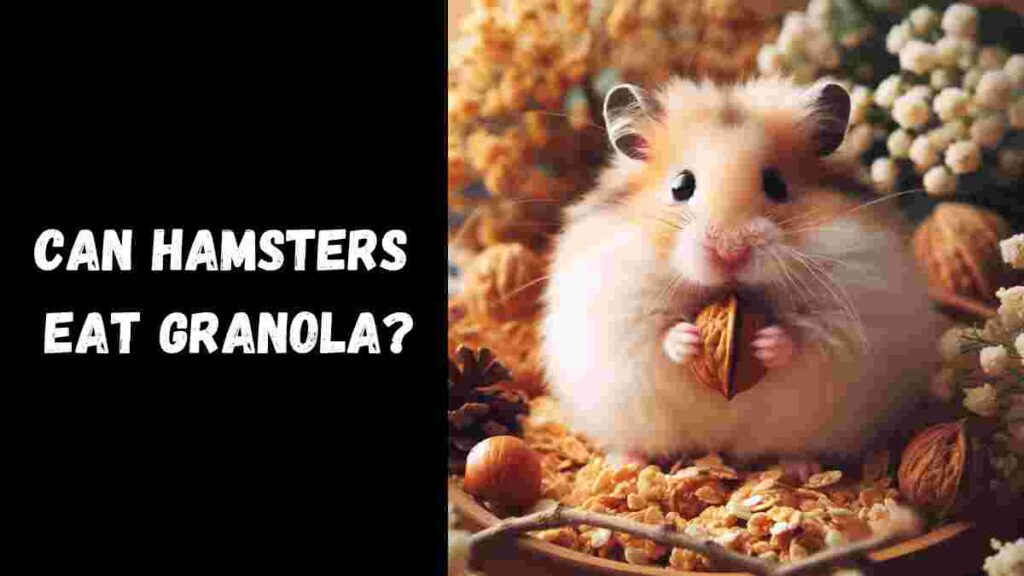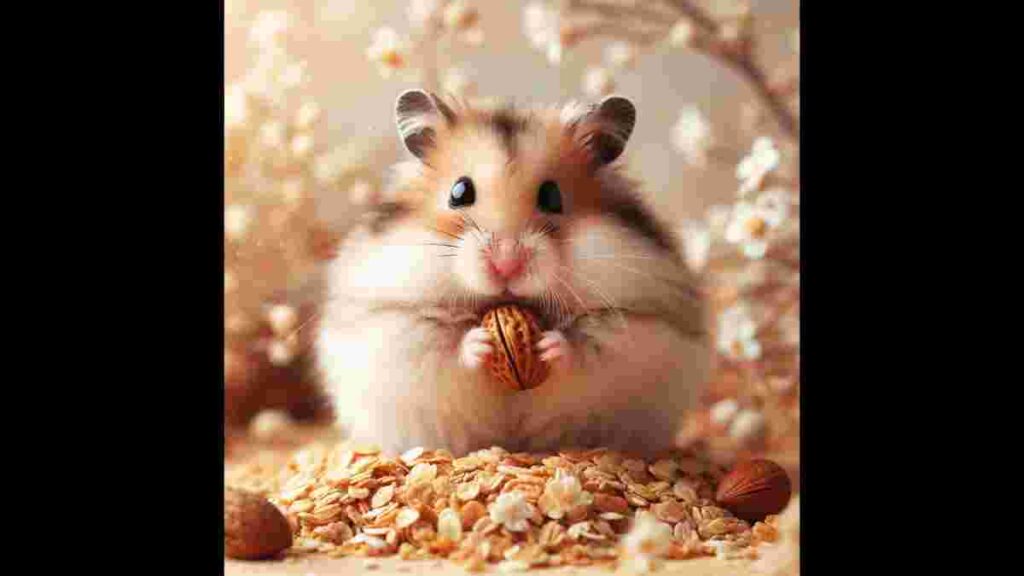Can Hamsters Eat Granola: For many pet owners, the joy of having a hamster revolves around their adorable antics, cute whiskers, and the endearing way they stuff their cheeks full of food. However, while hamsters may sometimes look like they can eat anything, their health and happiness require a diet that is carefully balanced and structured.
Granola, with its wholesome reputation, often prompts the question among pet owners: Is it suitable for my hamster? In this comprehensive exploration, we’re going to pour over the granules of granola to determine whether or not it’s a fit-for-fur treat for your pet hamster.
Find the best food for your hamster buddy
Find hamster bedding solutions here

Table of Contents
Understanding Hamster Dietary Requirements
Hamsters, despite their diminutive size, have big nutritional needs. These furry friends prefer to dine on a diet that mirrors their natural habits, which typically includes a combination of high-quality pellets, fresh vegetables, and occasional healthy treats.
Nutritional Needs of Hamsters
Hamsters require a diet high in fiber to maintain their digestive health, low in fat to regulate cholesterol levels, and with moderate protein content for muscle and tissue development. In addition, they need a variety of vitamins and minerals, all of which should be achieved through a balanced, species-appropriate diet.
Foods That Are Safe for Hamsters
Safe foods for hamsters include fortified hamster pellets (in moderation), fruits such as apples, pears, and berries, and a range of vegetables like carrots, cucumbers, and spinach. High-quality hay is also a crucial part of their diet, aiding in natural foraging behavior and dental health.
Foods to Avoid Feeding Hamsters
There are several foods that are harmful to hamsters, including citrus fruits, onions, garlic, and certain seeds that could cause choking or other health issues. Additionally, sugary and fried foods are best kept far away from your hamster, as they can lead to obesity and dental problems.
Examining Granola Ingredients
Granola is often described as a health food, but the devil can be in the details when it comes to pet diets. Commonly, granola is a mix of rolled oats, nuts, seeds, and a sweetener such as honey or maple syrup, sometimes with additional ingredients like dried fruit.
Common Ingredients Found in Granola
Granola ingredients can vary, but some staples are whole grain oats, nuts (like almonds or walnuts), seeds (such as pumpkin or sunflower seeds), and potentially dried fruits (like raisins or cranberries).
Nutritional Content of Typical Granola
Granola can be quite calorically dense due to the nuts and seeds, and its composition often translates to a high content of fats and sugars, albeit of the healthier, unsaturated variety. The complex carbohydrates from oats also provide a fair amount of energy.
Potential Benefits and Risks for Hamsters
The fiber content from oats and the additional benefits from nuts and seeds may make granola seem like a healthy snack. However, the potential for an upset hamster digestive system due to the sweeteners, fats, and the concentrated calorie content should not be overlooked.

Can Hamsters Eat Granola?
The million-dollar question – can our dainty hammies enjoy a helping of granola? The answer is not as straightforward as we might hope.
Factors to Consider Before Feeding Granola to Hamsters
Before deciding to share granola with your hamster, consider the overall nutritional content, including the sugar and fat levels, and how this might affect the balance of their diet.
Risks Associated with Feeding Granola to Hamsters
The high sugar content of some granolas can be particularly concerning, as hamsters are prone to diabetes. Furthermore, the nuts and seeds might pose a choking hazard, and certain nuts should be avoided altogether.
Moderation and Portion Control
If you do choose to offer granola as a treat, do so sparingly and ensure it’s an occasional indulgence. A piece or two once in a while should suffice for our tiny, treat-loving friends.
Alternatives to Granola for Hamsters
Thankfully, there are plenty of other treats that hamsters can enjoy without the associated risks.
Safe and Healthy Treats for Hamsters
Experiment with a variety of safe treats, like bits of apple, cucumber, and plain, unsweetened whole grain cereals. Hamsters also love the occasional mealworm, which can serve as both treat and supplemental protein.
DIY Hamster Treats Recipes
For the crafty owner, consider making homemade treats. A simple mix of hamster-safe seeds can be baked into a nibble, ensuring complete control over what goes into your hamster’s snack.
Commercial Hamster Treats Options
If DIY isn’t your style, there are plenty of commercial treats specifically designed for hamsters that can be found at pet stores. These are often formulated to meet their dietary needs and come in a range of flavors and textures.

Precautions and Guidelines for Feeding Hamsters
When introducing new foods to any pet, it’s important to do so with care and attention to their individual needs.
Tips for Introducing New Foods to Hamsters
Gradually introduce new foods to your hamster’s diet to monitor any adverse reactions. This helps to prevent sudden changes that could upset their sensitive digestive system.
Signs of Digestive Issues or Allergies in Hamsters
Keep an eye out for changes in poop consistency, lack of appetite, or unusual behavior, as these could be signs of a negative reaction to a new food or treat.
Consulting a Veterinarian for Dietary Advice
When in doubt, seek professional advice. A veterinarian will be able to give personalized guidance on your hamster’s diet and nutritional needs.
Conclusion – Can Hamsters Eat Granola?
In the grand scheme of a hamster’s diet, granola should be firmly placed in the treat category, enjoyed infrequently and in small quantities. While certain parts of granola can offer beneficial nutrients, it’s crucial to consider the overall profile of the food and how it fits into your pet’s diet.
Final Verdict: Can Hamsters Eat Granola?
Like most things in a pet’s life, the decision to feed granola to your hamster is not black and white. It’s about understanding the ingredients, being aware of potential risks, and ensuring that what you offer complements their daily diet.
When it comes to granola, tread carefully and consult with a veterinarian if you’re uncertain. Ultimately, the happiness of your hamster comes from a balanced and thoughtful approach to their well-being, and that includes the treats they snack on. Stay educated, stay mindful, and keep those cute little hamsters healthy and content.
Frequently Asked Questions (FAQ) – Can Hamsters Eat Granola?
Can hamsters eat granola?
While granola contains several ingredients that may seem suitable for hamsters, it’s not an ideal food choice due to its high sugar, fat, and calorie content. Feeding granola to hamsters should be approached with caution.
What are the risks of feeding granola to hamsters?
Granola often contains nuts, dried fruits, and added sugars, which can be harmful to hamsters if consumed in excess. These ingredients may cause digestive issues, obesity, or dental problems in hamsters.
Are there any benefits to feeding granola to hamsters?
Granola may provide some nutritional value to hamsters, such as fiber and certain vitamins and minerals. However, these benefits can be outweighed by the risks associated with its high sugar and fat content.
How much granola can I feed my hamster?
It’s recommended to limit the amount of granola given to hamsters and offer it as an occasional treat rather than a staple food. A small piece or a pinch of granola once in a while is sufficient.
What are some alternatives to granola for hamsters?
Hamsters can safely enjoy a variety of treats, including fresh fruits and vegetables, plain cooked grains like rice or oats, and specially formulated hamster treats available commercially. These options provide better nutritional balance for your pet.
How do I introduce new foods like granola to my hamster’s diet?
Introduce new foods gradually and in small quantities to monitor your hamster’s reaction. Watch for any signs of digestive upset, such as diarrhea or bloating, and discontinue feeding if any adverse effects occur.
Should I consult a veterinarian before feeding granola to my hamster?
It’s always a good idea to consult with a veterinarian knowledgeable about small pet care before introducing new foods to your hamster’s diet. They can offer personalized advice based on your hamster’s specific health needs.
What are the signs that my hamster is having trouble digesting granola?
Signs of digestive issues in hamsters may include changes in stool consistency, decreased appetite, lethargy, or abdominal discomfort. If you notice any of these symptoms after feeding granola, it’s best to stop feeding it and consult a veterinarian.
